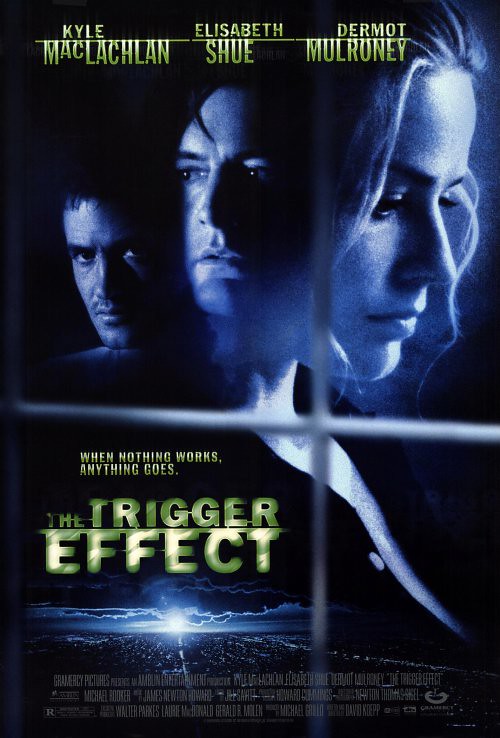
David Koepp is a pretty big name in screenwriting, and occasionally he directs his own scripts as well. This is apparently his first time directing a feature. It's not terribly good. Although he's not my very favorite writer by a long shot, his name is on a number of respectable, decent-to-great projects (among many others, he wrote Jurassic Park, Carlito's Way, Panic Room, War of the Worlds, and the just-watched Zathura), it's clear that at this point he's better with the page than with the picture. Seems like everything about The Trigger Effect would feel good on paper but it all comes across as toothless, over-polished, and non-threatening in the film. From the get-go this is true, as the opening shot, a complicated long take that moves fluidly through a shopping mall and follows a contagious bad mood that spreads quickly and gains momentum until we finally meet our milquetoast hero Matthew and his pushy-but-she-has-a-point wife Annie. During this, a drink is spilled in an unintentionally funny over-the-top way and the two men involved both react really unnaturally (too casual, the spiller; angry but too dismissive, the spillee). Later we track a man into a movie theater to find his friend and presumably, from the way he plays the scene, it's supposed to be pitch dark. It's not. It's not even dim. It's so well lit with such a deep focus that you would never mistake it for a darkened auditorium, and no amount of pretending to peer into the "darkness" or loud gunshots on the soundtrack (to tell us the movie is already playing) are going to ever convince you of it.
This is the problem with the movie. It's about a power outage, where the "moonlight" is brighter than your average evening sun. It's about the collapse of society and the tensions that are supposed to build because of it, but our hero goes from coward to desperate crook with almost no provocation, and yes he's trying to help his family, but the whole story reads less like the slow-build pressure cooker it seems to want to be and more like a turn on a dime from order into chaos, from law into anarchy. Just about all of the dramatic beats and personal conflicts feel forced, unnatural, and worst of all, unearned. I get that many scenes are meant to play for moral ambiguity (as with Michael Rooker and Raymond, who is a lone black man in a seemingly hick-filled bar), but too many scenes just come off as conflicts between two unlikeable people being unreasonable. In short, it's not that outlandish of an idea, and it keeps flirting with being a smartly told, tightly wound thriller story, but it never works. There's never enough tension because the scenario never feels credible. I cannot stress how unbelievable the lighting is, among other things, or how crucial these kinds of details are to making the story work.
The bottom line is, this shows just how important the little details are, making your audience believe in the world of your story above all else. If I get pulled out by obvious lines, unrealistic action or lighting, or easy resolutions (do not get me started on Matthew and Raymond's Mexican standoff inside Raymond's house at the story's climax), I will probably never get fully back into the story. Skepticism is a tough bug to shake (though this film keeps you at a skeptic's distance throughout). No matter how decent a script is, a script is just the blueprint. It's got to work as a movie or it doesn't work at all.

No comments:
Post a Comment